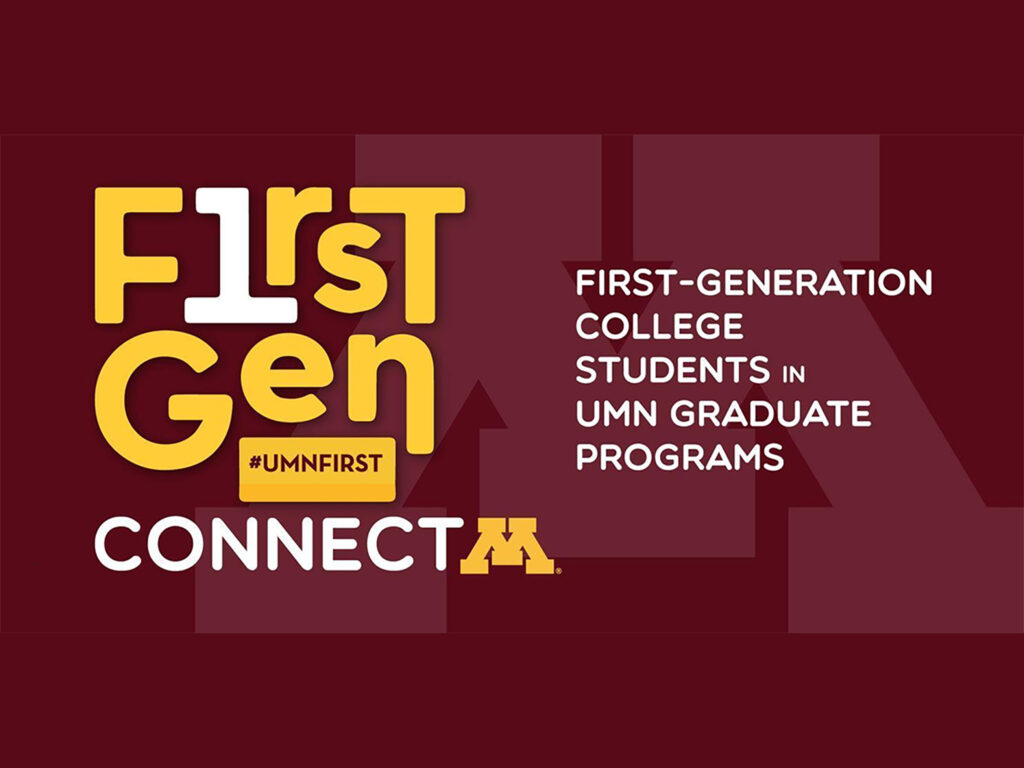First-Gen Connect empowers and assists students through graduate school
The program helps first-generation students connect with peers and develop skills for graduate school.

First-Gen Connect provides a supportive framework for first-generation graduate students, helping to guide them through graduate school and get involved around campus.
By Ben Wagner
Graduate school can present many challenges for first-generation students. Feelings of insecurity, financial and familial pressure, and a lack of easily accessible financial and academic resources are some of the roadblocks these students face.
Shelby LaFreniere, a graduate programs and academic support specialist for the University of Minnesota School of Dentistry, said first-generation students don’t always know how to recognize or look for helpful college resources, much less use them.
“If you’re an engaged student, and you’re really looking for resources, you’re gonna find them,” LaFreniere said, who was a first-generation student herself. “If you’re not [accustomed to] looking for them, I’m not sure that it’ll be as easy.”
First-Gen Connect is a support network for graduate students at the university designed to address some of these barriers and set students up for academic and professional success. It also gives them a chance to share their perspectives with other students who may be going through the same experience.
Work on First-Gen Connect began in the fall of 2020 after the Graduate School’s faculty recognized that first-gen graduate students had specific needs for navigating academia that were not being met. Often, academic programs focused too much on skills students lacked instead of ones they already had.
The result is that students often feel as if there is something they don’t quite understand about the academic environment — as if there’s a “hidden curriculum,” said Noro Andriamanalina, the assistant vice provost in the Graduate School who oversees the First-Gen Connect program.
That “hidden curriculum” felt real to Alyssa Palmer, a first-gen grad student who received her master’s in developmental and child psychology in 2018 and her doctorate in clinical child psychology in 2023.
“There were often times when I felt like I was missing key pieces of information about how academia worked that my colleagues seemed to have or understand,” Palmer said.
Andriamanalina said First-Gen Connect provides resources designed to reveal that “hidden curriculum” to students. These include an individual development plan, which lets students set goals and look ahead to see what’s expected of them and identify skills they will need to develop.
“We leverage their strengths to support them through their graduate programs that have always focused on the deficits,” Andriamanalina said. “We don’t want to ignore the fact that they do have unique needs, but we also don’t want to just keep focusing on their needs.”
The First-Gen Connect plan is flexible, and students can work with advisers to customize their academic experience for what best fits their needs.
“You can change the rules on us,” Andriamanalina said. “Change it if it’s not working for you and own your experience.”
First-Gen Connect also offers professional networking opportunities for students through mentoring workshops and panels. A panel of faculty, staff and students is brought together every semester to talk about areas specific to the first-gen experience and share advice.
The program worked with the Alumni Association to create a Maroon and Gold Network page focused specifically on first-generation students.
First-Gen Connect also empowers students and connects them with peers who they can share their experiences with. The program helped support the development of the Association of First Generation Graduate Students, which was formed in March of 2023.
“As students, you have a voice yourself,” Andriamanalina said. “And you need to create a student organization to advocate for your needs.”
Ultimately, Andriamanalina sees success in First-Gen Connect through students becoming more confident, engaged and involved in all aspects of the graduate student experience, using their first-gen identity as a connecting point for peers, faculty and staff.
“You pay fees at the university not just to be part of First-Gen Connect,” Andriamanalina said. “You pay fees to be a part of the whole university…You belong everywhere.”

